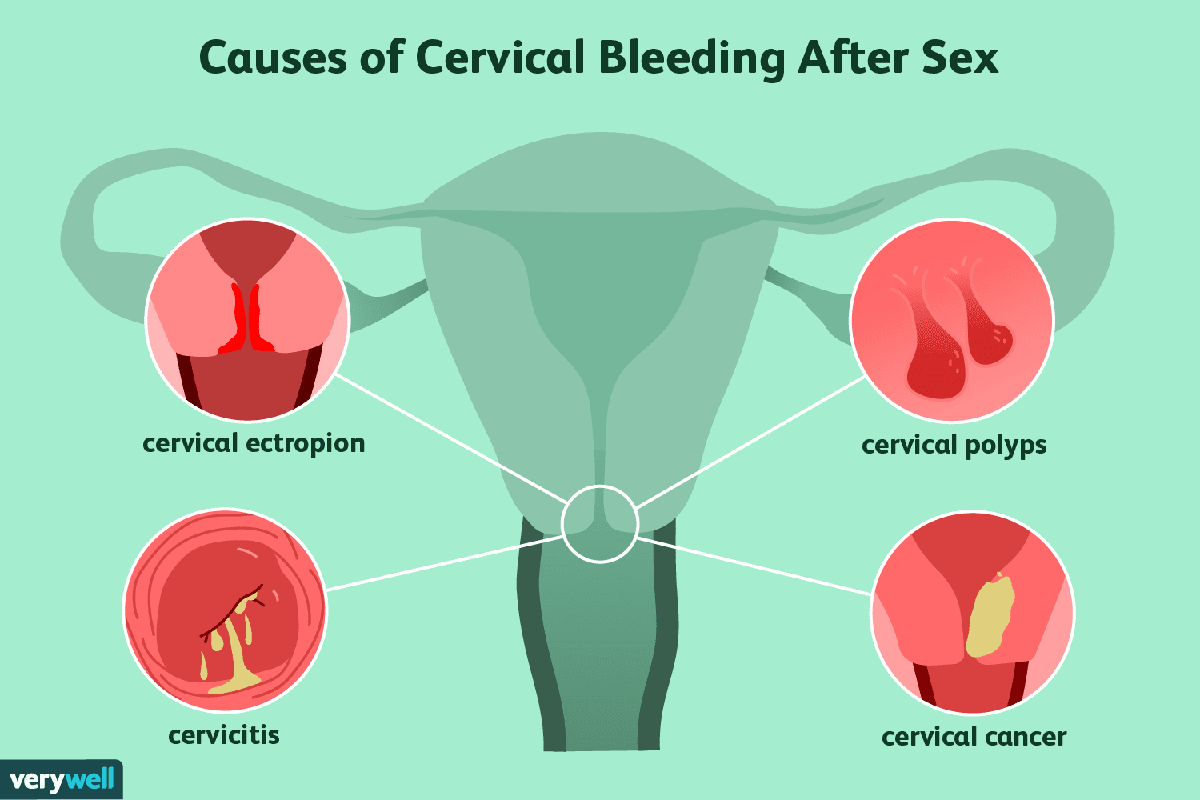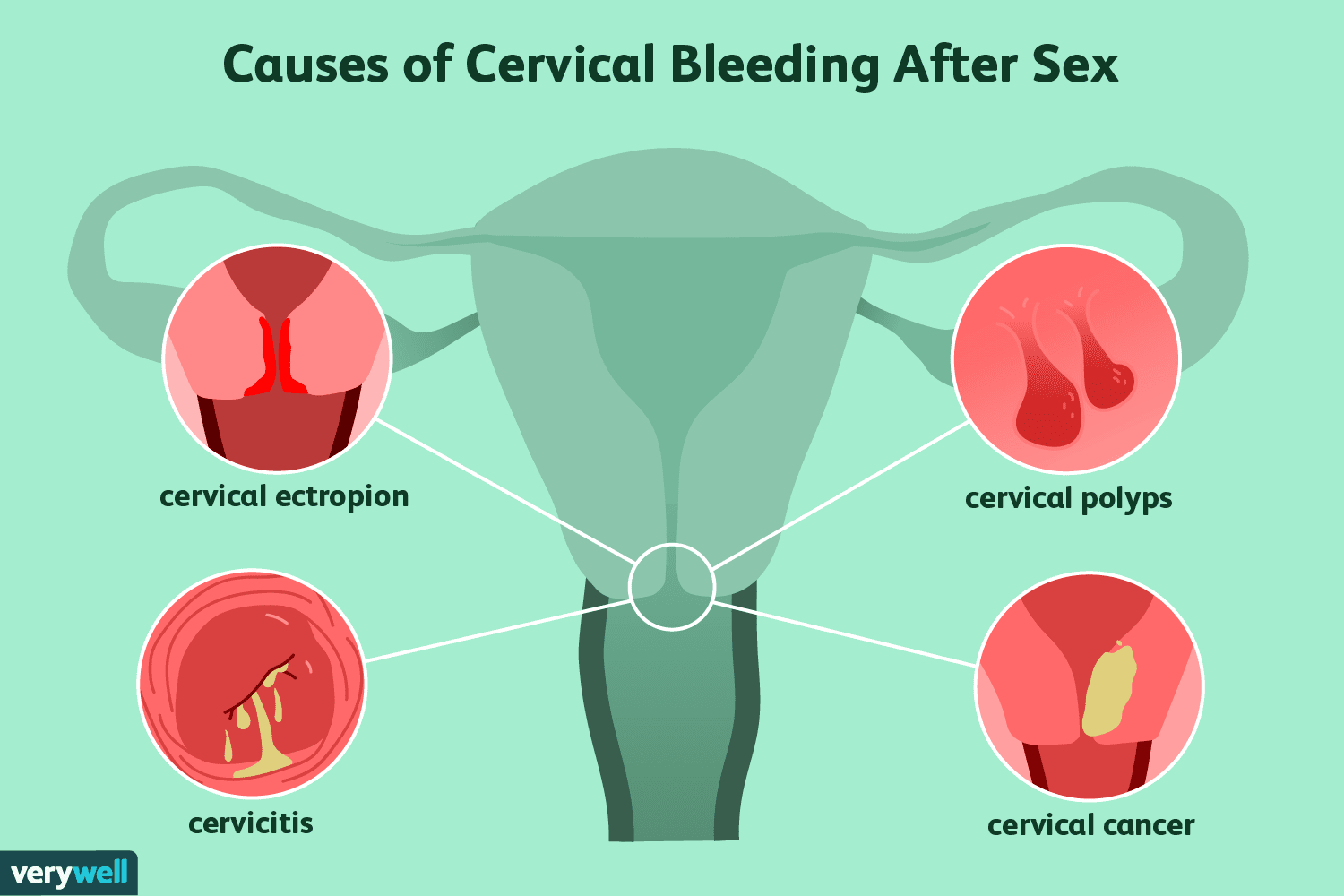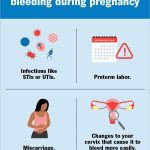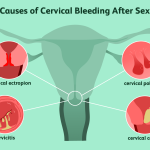When it comes to sexual health, there’s nothing quite as unsettling as experiencing bleeding after sex. It’s a concern that can leave you feeling anxious, confused, and maybe even a little embarrassed. But the truth is, post-coital bleeding is a common experience for many people, regardless of their age or gender.
Why Bleeding After Sex Causes Concern
The moment you notice blood in your underwear or on your sheets after having sex, it’s natural to start wondering if everything is okay. The truth is, post-coital bleeding can be a sign of many things – some serious, others not so much.
Understanding the Reasons Behind Post-Coital Bleeding
In this blog post, we’ll delve into the reasons why bleeding after sex might cause concern and explore what you should know to feel more empowered about your sexual health. But before we dive in, let’s start with one of the most common causes: cervical changes.
Cervical Changes: The Most Common Cause of Post-Coital Bleeding
As women go through hormonal changes during their menstrual cycle or experience menopause, the cervix can become thinner and more sensitive. This increased sensitivity can lead to bleeding after sex, especially if the cervix is already irritated from cervical mucus or other factors.
It’s essential to understand that cervical changes are a normal part of life, and they don’t necessarily indicate an underlying medical issue. However, it’s crucial to discuss any concerns with your healthcare provider to rule out any potential complications or infections.

In our previous segment, we explored the common concern of bleeding after sex and the role of cervical changes as a potential cause. Now, let’s dive deeper into other reasons why post-coital bleeding might cause concern.
Other Reasons Why Post-Coital Bleeding Might Cause Concern
While cervical changes are a common cause of post-coital bleeding, they’re not the only reason why this phenomenon might be concerning. Let’s examine some additional factors that could contribute to bleeding after sex:
- Hormonal Changes**: Hormonal fluctuations during pregnancy, menstruation, or menopause can lead to increased blood flow and sensitivity in the cervix, resulting in post-coital bleeding.
- Infections or Inflammation**: Sexually transmitted infections (STIs) like chlamydia, gonorrhea, or herpes can cause cervical inflammation, leading to bleeding after sex. Similarly, vaginal yeast infections or bacterial vaginosis can also trigger bleeding.
- Pelvic Organ Prolapse**: Weakened pelvic muscles and weakened connective tissue can lead to a prolapse of the uterus, bladder, or rectum, causing bleeding during sex or at other times.
- Surgery-Related Bleeding**: Certain gynecological surgeries, such as a hysterectomy or dilation and curettage (D&C), can cause temporary post-coital bleeding due to trauma or scarring in the cervix.
It’s essential to remember that most cases of post-coital bleeding are not indicative of an underlying medical issue. However, if you’re experiencing heavy or prolonged bleeding, it’s crucial to consult your healthcare provider to rule out any potential complications or infections.
Luckily, there are many ways to minimize the risk of post-coital bleeding, such as:
- Practicing safe sex with condoms and regular testing for STIs
- Maintaining good vaginal hygiene and avoiding irritants like harsh soaps or douches
- Engaging in gentle, shallow penetration to reduce trauma to the cervix
By understanding the various reasons behind post-coital bleeding, you can take control of your sexual health and feel more empowered in your relationships. In our next segment, we’ll explore ways to discuss post-coital bleeding with your healthcare provider and develop a plan for maintaining optimal vaginal health.
Learn more about sexual health and relationships Explore the CDC’s guidelines for treating sexually transmitted infectionsGet Expert Guidance on Post-Coital Bleeding
Our team of medical professionals is here to help you understand the reasons behind post-coital bleeding and provide expert advice.
Consult a Medical ExpertWhen it comes to sexual health, there’s nothing quite as unsettling as experiencing bleeding after sex. It’s a concern that can leave you feeling anxious, confused, and maybe even a little embarrassed. But the truth is, post-coital bleeding is a common experience for many people, regardless of their age or gender.
Why Bleeding After Sex Causes Concern
The moment you notice blood in your underwear or on your sheets after having sex, it’s natural to start wondering if everything is okay. The truth is, post-coital bleeding can be a sign of many things – some serious, others not so much.
Understanding the Reasons Behind Post-Coital Bleeding
In this blog post, we’ve explored the reasons why bleeding after sex might cause concern and delved into what you should know to feel more empowered about your sexual health. From cervical changes to hormonal fluctuations, we’ve covered some of the most common causes of post-coital bleeding.
So, what can you do if you experience bleeding after sex? First and foremost, don’t panic! If you’re experiencing persistent or heavy bleeding, it’s always a good idea to consult with your healthcare provider. But for many people, post-coital bleeding is simply a normal part of life – a sign that their body is adapting to hormonal changes or cervical shifts.
Remember, sexual health is all about being informed and taking control of your own well-being. By understanding the reasons behind post-coital bleeding, you can take the first step towards addressing any concerns and prioritizing your overall health. So, go ahead – breathe a sigh of relief, knowing that you’re not alone in this experience. And remember, it’s always better to be safe than sorry when it comes to your sexual health.
A Final Word: Empowerment Through Education
As we wrap up this blog post, I want to leave you with a crucial takeaway: education is power. By learning more about your body and the reasons behind post-coital bleeding, you can take control of your own sexual health and feel empowered to tackle any concerns that may arise.
A Call to Action
So, what are you going to do with this newfound knowledge? Take it as an opportunity to prioritize your sexual health, whether that means scheduling a check-up with your healthcare provider or simply being more mindful of your body’s changes. Remember, you’re not alone in this journey – and by taking control of your own well-being, you can live a happier, healthier life.
Black Beans Nutrition Fact: Boost your nutrition game with the amazing health benefits of black beans! From high protein content to impressive antioxidant levels, find out why this superfood should be a staple in your diet.
The Best Dog for a Single Female Living in an Apartment: Ready to bring home the perfect furry companion? Learn which breeds thrive in small spaces and make great friends for busy, urban singles. Don’t miss out on these paw-some recommendations!




